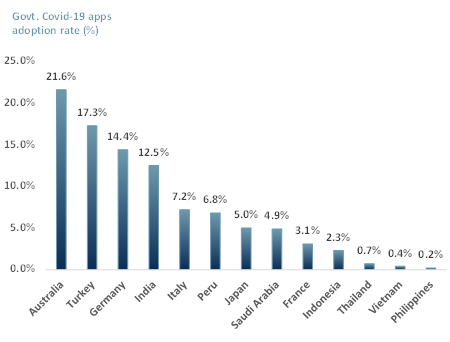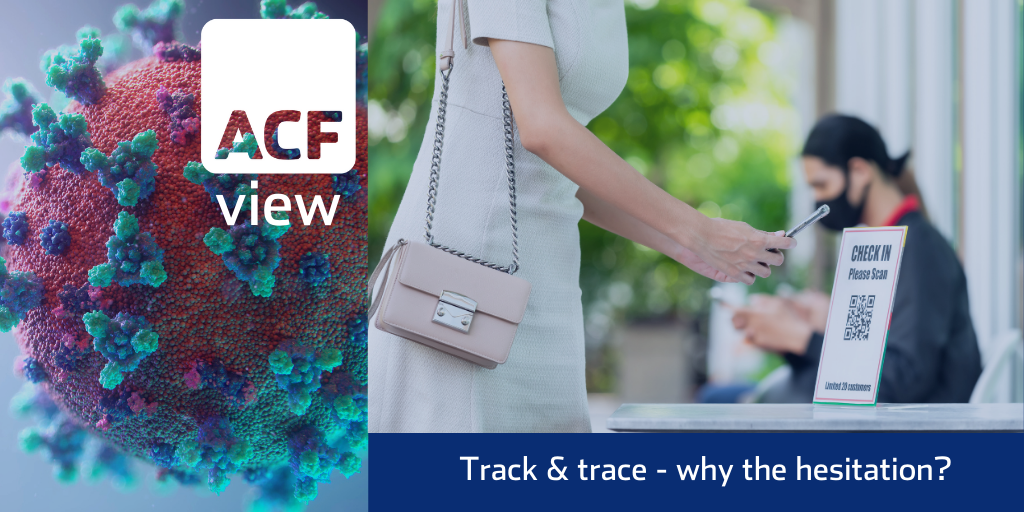Track & trace – why the hesitation?
Track and trace tools have long been effective in managing outbreaks. So why the hesitation with the Covid-19 pandemic?
Turkey’s Ministry of Health has a long standing history of tracing diseases since the Republic was formed in 1922. As a result Turkey, for Sars-Cov-2 track and trace adoption rates, ranks second highest in table below (see Exhibit 1 below).
Exhibit 1 – Government endorsed Covid-19 tracing apps adoption rates -selected countries, July 2020
 Sources: ACF Equity Research; Sensor Tower
Sources: ACF Equity Research; Sensor Tower
- Kit – Medical professionals in Turkey hit the ground armed with computers, tablets, protective suits, goggles and medical kits to track individuals who have C19. Turkish teams also track if someone has come in direct contact with 2020 pandemic carriers.
- Medication – The role of the Turkish healthcare service is to test these individuals and provide medications for those staying at home. Also to ensure that those individuals testing positive for pandemic Corona virus are isolating or quarantining.
- Daily calls – Made by the Turkish medical service to check on the overall wellbeing of those infected with the contagious respiratory and vascular disease.
- Large teams – The Turkish government has deployed approximately 9,300 teams for contact tracing since the start of the pandemic. As a result cases have remained low – 422 cases per 100k people and only 11 deaths per 100k.
- Reassignment of professionals – In addition, medical professionals in low demand – e.g. dentists, health inspectors – were reassigned and trained to carryout contact tracing in order to meet the demand of the scale of the pandemic.
- Data collection and distribution – Data collected through the Turkish medical service systems/apps is stored in contact tracing divisions of local health ministries and made available to hospitals and testing centres.
- Turkey is a strong contender in the healthcare industry. Cost of treatment is low but quality is high.
- A heart bypass, for example, costs $15k in Turkey compared to the US ($130k), the UK ($28k) and Germany ($17k).
- Turkey has 60 internationally competitive medical faculties.
- Big pharma (e.g. Pfizer, Glaxo-Smith Kline, Johnson & Johnson) have a presence.
- Turkey is a hub for cosmetic surgery due to the high level of expertise of Turkish surgeons.
Turkey may be leading the way in the use of contact tracing apps however, the Turkish scientific board and researchers (i.e public health specialists) are battling with a lack of transparency in government reporting. There are suspicions that the actual reported numbers are artificially low.
In order to successfully fight and beat this virus, governments and the healthcare sector need to work together and not against each other. The end goal is to ensure timely, accurate and efficient medical care for everyone.
A growing concern globally is the lack of compliance around the contact tracing app by individuals that may have been exposed to the virus. Rather than imposing the threat of law, as China and Turkey have done, there is a need for education – by providing accurate, clear and non-conflicting information.
Governments and healthcare institutions also need to make sure that data privacy policies have been updated accordingly, i.e. the data will only be used for the sole purpose of tracking Sars-CoV-2 infections, as that too will give people peace of mind when using the apps.
The main issue, in our view, is that people do not want to be, or cannot afford to be, unnecessarily quarantined. People do not trust their governments’ systems to make the right call in terms of restrictions on individual movement during the 2020 pandemic.
Governments and industry can do better. We forecast that R&D spend in healthcare will reach in excess of USD 200bn by 2025E up from $185bn in 2020 (a 5% CAGR), suggesting that at least companies are going in the right direction, and that will provide opportunities for investor interested in the healthcare sector.
















